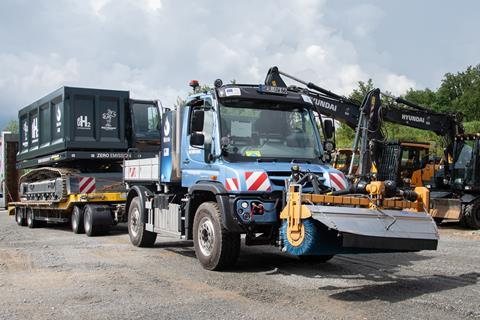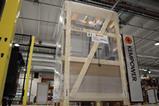Mercedes-Benz Special Trucks and Mörtlbauer Baumaschinen Vertriebs have unveiled two vehicle prototypes with hydrogen combustion engines, marking the culmination of the WaVe development project, a two-year initiative funded by Germany’s Federal Ministry for Economic Affairs and Climate Action.

The prototypes, a Unimog implement carrier and a crawler dump truck, were demonstrated at Mörtlbauer’s premises in Fürstenzell, Bavaria. Both vehicles have undergone testing in driving, working, and refueling operations.
Franziska Cusumano, Head of Mercedes-Benz Special Trucks, said: “After numerous test deployments, emission measurements, and technical fine tuning, we are convinced that hydrogen combustion for work machines with high power requirements, both for driving and for powering auxiliary drives, is worthwhile, practical, and very low in emissions.”
Armin Mörtlbauer, Managing Director of Mörtlbauer Baumaschinen Vertriebs, commented: “The fact that our crawler and the Mercedes-Benz Special Trucks Unimog can be easily refueled with gaseous hydrogen and that these vehicles also work reliably when using implements is the result of the outstanding cooperation in this research partnership.”
He continued: ”We have researched and understood this technology. We now have the corresponding experience and data, however, to apply these in series production, we have to go even further on this path. If the government and society choose to follow the path toward hydrogen combustion engines, we are ready to go.”
The Unimog U 430 and the crawler were equipped with modified medium-duty engines adapted for hydrogen propulsion. The Unimog’s engine delivers approximately 290 hp and 1000 Nm of torque, comparable to a 300 hp diesel variant. It carries about 13 kilograms of gaseous hydrogen in four 700 bar high-pressure tanks.
The crawler dumper has similar specifications, with a 14.5-kilogram hydrogen capacity at 700 bar. It can carry a payload of 30 metric tonnes and has a bed capacity of 16 cubic meters.
The WaVe project, which began in July 2021, involved 18 partners from industry and science. Its objective was to develop a hydrogen-based drive system for working machines as an alternative to conventional diesel engines. The project has demonstrated that hydrogen-powered vehicles and working machines can operate similarly to current diesel engines with only minor modifications to drivetrain components.


















